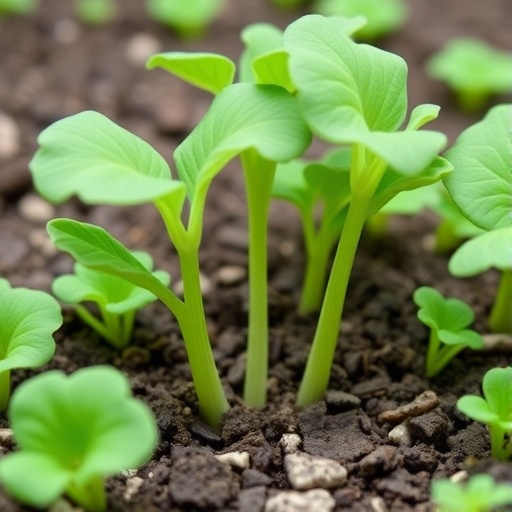New Research Offers Hope for Sustainable Agriculture Amid Rising Water Contamination Risks
In an era where agricultural practices are increasingly scrutinized for their environmental impacts, a groundbreaking study sheds light on a novel approach to mitigate the risks posed by contaminated irrigation water. Researchers have delved into the potential of selected rhizobacteria strains to enhance the tolerance of Vicia faba, commonly known as faba beans, against harmful pollutants like microcystins. These toxins, primarily produced by certain cyanobacteria, pose significant health risks to both plants and humans, underscoring the urgency for innovative solutions in agricultural management.
By adopting this method, the researchers aim to significantly improve the resilience of faba beans, a staple crop in multiple regions worldwide. The ability of plants to withstand the detrimental effects of microcystins is not only essential for their survival but also has direct implications for food safety and human health. This work comes at a critical time when global water sources are being compromised by agricultural runoff and nutrient loading, leading to harmful algal blooms that produce these toxins.
The study, led by N. Elidrissi El Yallouli and her team, demonstrates how specific strains of rhizobacteria can bolster plant health in the face of microcystin contamination. The carefully selected strains were shown to enhance the plants’ metabolic pathways, enabling them to degrade and detoxify the microcystins present in irrigation water. This innovative bioremediation technique offers a dual benefit: it not only helps the plants flourish despite adverse conditions but also contributes to reducing the overall toxicity of the irrigation water.
As the world grapples with increasing cases of water pollution, particularly in agricultural contexts, the study’s findings provide robust evidence supporting the integration of microbial inoculants in farming systems. The successful application of these rhizobacteria could revolutionize conventional farming practices, allowing farmers to cultivate crops in areas previously deemed unsuitable due to water contamination. This could lead to significant enhancements in crop yields, food security, and sustainability.
One of the standout elements of the research is its emphasis on ecological balance. By utilizing natural soil microorganisms, farmers could potentially reduce their dependence on chemical fertilizers and pesticides, which are known to have adverse environmental impacts. This eco-friendly approach aligns with the principles of sustainable agriculture, advocating for practices that preserve biodiversity while maintaining productivity.
Data from the study revealed that plants treated with these specialized rhizobacteria demonstrated not only improved growth rates but also enhanced nutritional profiles. The potential for increased yields of nutrient-dense food could substantially benefit communities, especially in regions where food insecurity is prevalent. This aspect highlights the broader implications of the research beyond mere agricultural productivity; it touches upon public health and nutrition.
Moreover, the study discusses the mechanisms through which these rhizobacteria exert their beneficial effects on Vicia faba. Through enhanced root development, increased nutrient uptake, and even possible systemic resistance to pathogens, the plants equipped with these microorganisms exhibit remarkable adaptations. These biochemical and physiological improvements emphasize the intricate relationships between plants and their microbiomes, a burgeoning field of study that promises to unveil new agricultural strategies.
Despite the promising results, the authors caution about the scalability and practical application of this research. Challenges such as the variability in soil types, climatic conditions, and the specific strains of rhizobacteria need to be addressed to ensure widespread implementation. A multi-national effort may be required to tailor these findings to various agricultural contexts across the globe.
In addition to focusing on crop resilience, the research also raises important questions about the long-term impacts on ecosystems. Understanding how the introduction of certain microbial strains might influence soil health, microbial diversity, and the broader environmental context is crucial. These factors will need thorough investigation to promote sustainable practices that do not inadvertently disrupt local ecosystems.
As the global community continues to confront mounting environmental challenges, this research serves as a timely reminder of the innovative solutions that can emerge from scientific inquiry. The fusion of traditional agricultural knowledge and cutting-edge biotechnological developments holds considerable promise for future food systems. By prioritizing research in sustainable practices, we can create pathways to not only enhance food security but also improve public health outcomes significantly.
In conclusion, the study authored by Elidrissi El Yallouli and her colleagues offers an essential glimpse into the future of agriculture amid environmental challenges. Through the utilization of selected rhizobacteria strains, farmers can potentially cultivate healthier crops even in the presence of toxins, addressing both nutritional needs and health safety concerns. This research lays the groundwork for a new paradigm in agricultural science, where microbial solutions pave the way for resilient and sustainable food production systems.
Subject of Research: Rhizobacteria strains enhancing Vicia faba tolerance to microcystins.
Article Title: Selected rhizobacteria strains improved the tolerance of Vicia faba plants to microcystins contaminated irrigation water and reduced human health risk.
Article References: Elidrissi El Yallouli, N., Redouane, E.M., Mugani, R. et al. Selected rhizobacteria strains improved the tolerance of Vicia faba plants to microcystins contaminated irrigation water and reduced human health risk. Environ Sci Pollut Res (2025). https://doi.org/10.1007/s11356-025-37185-7
Image Credits: AI Generated
DOI: https://doi.org/10.1007/s11356-025-37185-7
Keywords: Rhizobacteria, Vicia faba, microcystins, irrigation water, sustainable agriculture, bioremediation, food security, environmental health.




